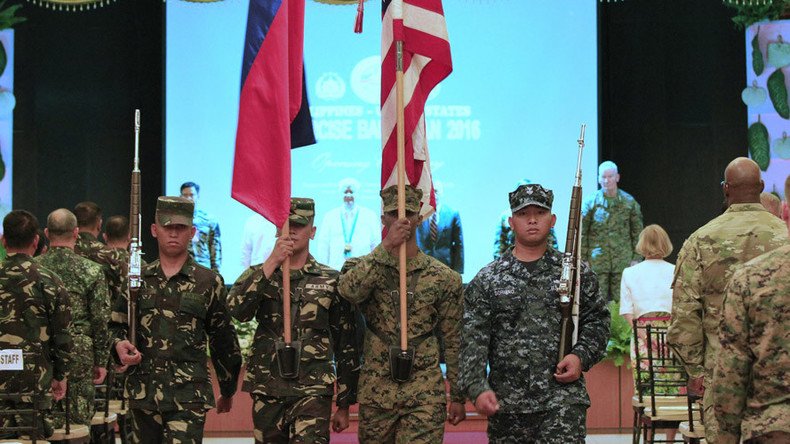Philippines, US launch large-scale naval drills ‘without China in mind’

The annual Balikatan military exercise has been launched in the Philippines, involving about 8,000 American and Filipino military. Troops are training to ensure maritime security in the region, where China bolsters its military presence continuously.
The drill will last for two weeks and is going to include, among other tasks, command-and-control interaction, combined operations in logistics and communication establishment, amphibious beach landing and recapture of oil and gas extraction facility. Australia is also joining the exercise with a small contingent, while Japan and Vietnam have dispatched officers to observe the training.
“The Balikatan exercise is designed not to address a particular concern but the whole lump in the spectrum of warfare,” Reuters cited Vice Admiral Alexander Lopez, the Philippine military's exercise director, as saying at a news conference.
To make sure that importance of the exercise is well understood by other players in the region, the US defense secretary is going to pay a first-ever visit to the maneuvers. Ash Carter is expected to be observing the exercise next week.
The commander of US Marine forces in the Pacific, Lieutenant-General John Toolan, told the news conference the joint task force is going to get trained to respond to any situation that could possibly occur in the region, which according to Toolan “absolutely” includes a hypothetical security crisis with China in the South China Sea.
The commander also said that, for the first time in the Philippines exercises, a mobile long-range truck-mounted multiple-rocket launcher (HIMARS) is going to be fired.
China has territorial disputes over a group of natural and artificial islands in the South China Sea, rich in deposits of natural resources, with most of its neighbors in the region, namely Brunei, Malaysia, the Philippines, Taiwan and Vietnam.
The South China Sea is also an extremely important trade route crossroads, with estimated US$5 trillion worth of goods shipped through the area annually. Beijing strives to maintain control over it since most of the goods and supplies passing there are either of Chinese origin or are destined for Chinese ports.
To assure that goal is reached, Chinese authorities have launched an unprecedented program of land reclamation in the South China Sea, which includes construction of airfields and port facilities on some reefs and isles, including construction of manmade islands.
The US Navy, which used to control the sea routes in the area over the last decades, is actively opposing the Chinese initiative, deploying additional warships into the disputed zone and conducting maneuvers in imminent vicinity to Chinese artificial islands and flying over them, citing the “freedom of navigation” principle as an excuse.
Beijing has warned Washington it plans to protect its sovereignty in the disputed waters of the South China Sea, rejecting to use international laws and freedom of navigation as a pretext to undermine its national security interests.
Xi warns Obama against threatening China’s sovereignty & national interests https://t.co/xxIjvyOTgCpic.twitter.com/EWLjs8tqFU
— RT (@RT_com) April 1, 2016
“China will firmly safeguard the sovereignty and related rights in the South China Sea,” Chinese President Xi Jinping told US President Barack Obama at the fourth Nuclear Security Summit in Washington, DC, according to Xinhua news.
While acknowledging that Beijing “respects and safeguards the freedom of navigation and overflight other countries are entitled to under international law,” Xi stressed that China will “not accept any freedom of navigation as an excuse to undermine China's sovereignty and national security interests.”













